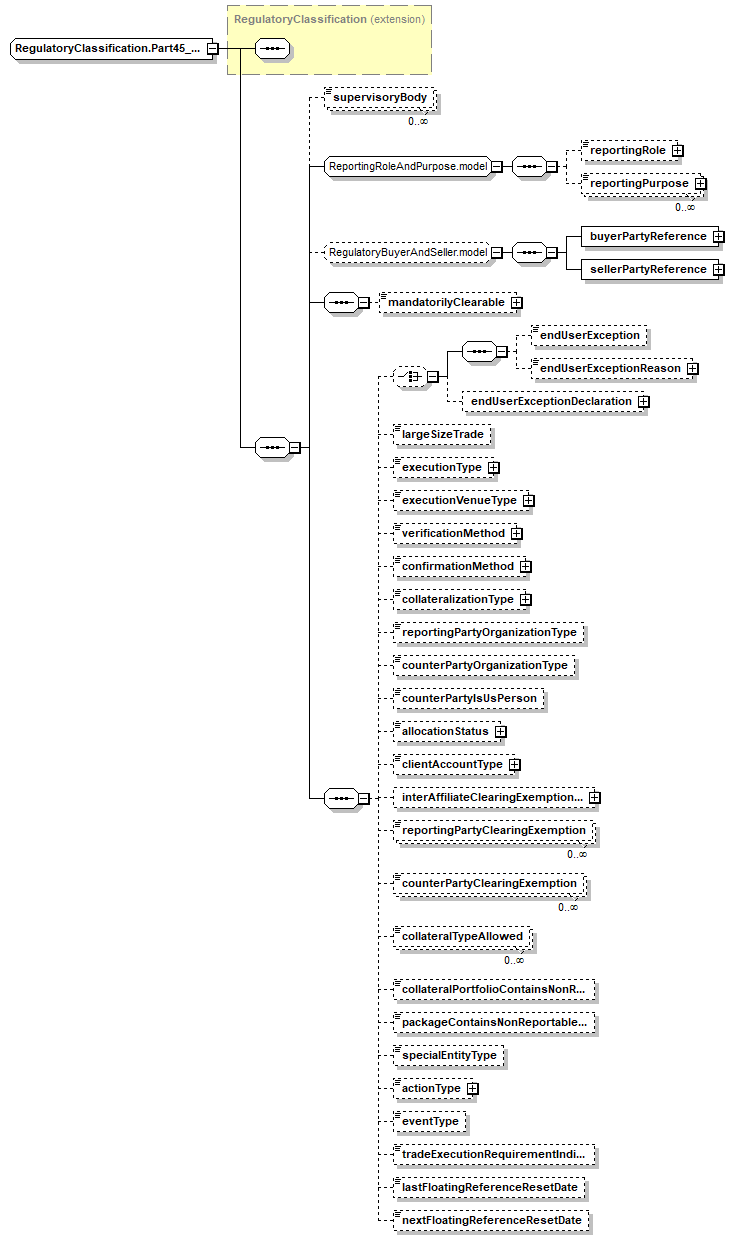
Namespace: |
|
Content: |
complex, 32 elements |
Defined: |
globally in fpml-recordkeeping-processes-5-11.xsd; see XML source |
Includes: |
definitions of 28 elements |
Used: |
at 1 location |

|
Type Derivation Tree
RegulatoryClassification (extension)
|
|
<xsd:complexContent>
<xsd:extension base="RegulatoryClassification">
</xsd:complexContent>
<xsd:sequence>
</xsd:extension>
<xsd:element maxOccurs="unbounded" minOccurs="0" name="supervisoryBody" type="xsd:token"/>
</xsd:sequence>
<xsd:sequence>
</xsd:sequence>
<xsd:sequence>
<xsd:choice minOccurs="0">
</xsd:sequence>
<xsd:sequence>
</xsd:sequence>
</xsd:choice>
<xsd:element maxOccurs="unbounded" minOccurs="0" name="reportingPartyClearingExemption" type="xsd:token"/>
<xsd:element maxOccurs="unbounded" minOccurs="0" name="counterPartyClearingExemption" type="xsd:token"/>
<xsd:element minOccurs="0" name="collateralPortfolioContainsNonReportableComponents" type="xsd:boolean"/>
</xsd:complexType>
|
Type: |
ActionType, simple content |
|
xsd:normalizedString
|
maxLength: |
255
|
minLength: |
0
|
Type: |
AllocationReportingStatus, simple content |
|
xsd:normalizedString
|
maxLength: |
255
|
minLength: |
0
|
Type: |
TradeCategory, simple content |
|
xsd:normalizedString
|
maxLength: |
255
|
minLength: |
0
|
Type: |
CollateralizationType, simple content |
|
xsd:normalizedString
|
maxLength: |
255
|
minLength: |
0
|
Type: |
xsd:boolean, predefined, simple content |
|
<xsd:element minOccurs="0" name="collateralPortfolioContainsNonReportableComponents" type="xsd:boolean"/>
|
Type: |
xsd:token, predefined, simple content |
Type: |
ConfirmationMethod, simple content |
|
xsd:normalizedString
|
maxLength: |
255
|
minLength: |
0
|
Type: |
xsd:token, predefined, simple content |
|
<xsd:element maxOccurs="unbounded" minOccurs="0" name="counterPartyClearingExemption" type="xsd:token"/>
|
Type: |
xsd:boolean, predefined, simple content |
Type: |
xsd:normalizedString, predefined, simple content |
Type: |
xsd:boolean, predefined, simple content |
Type: |
EndUserExceptionDeclaration, complex content |
Type: |
ClearingExceptionReason, simple content |
|
xsd:normalizedString
|
maxLength: |
255
|
minLength: |
0
|
Type: |
xsd:token, predefined, simple content |
Type: |
ExecutionType, simple content |
|
xsd:normalizedString
|
maxLength: |
255
|
minLength: |
0
|
Type: |
ExecutionVenueType, simple content |
|
xsd:normalizedString
|
maxLength: |
255
|
minLength: |
0
|
Type: |
PartyReference, empty content |
Type: |
xsd:boolean, predefined, simple content |
Type: |
xsd:date, predefined, simple content |
Type: |
ReportingBoolean, simple content |
|
xsd:normalizedString
|
maxLength: |
255
|
minLength: |
0
|
Type: |
xsd:date, predefined, simple content |
Type: |
xsd:boolean, predefined, simple content |
Type: |
xsd:token, predefined, simple content |
|
<xsd:element maxOccurs="unbounded" minOccurs="0" name="reportingPartyClearingExemption" type="xsd:token"/>
|
Type: |
xsd:normalizedString, predefined, simple content |
Type: |
xsd:token, predefined, simple content |
Type: |
xsd:token, predefined, simple content |
Type: |
xsd:boolean, predefined, simple content |
Type: |
VerificationMethod, simple content |
|
xsd:normalizedString
|
maxLength: |
255
|
minLength: |
0
|
|
XML schema documentation generated with DocFlex/XML 1.10b5 using DocFlex/XML XSDDoc 2.8.1 template set. All content model diagrams generated by Altova XMLSpy via DocFlex/XML XMLSpy Integration.
|